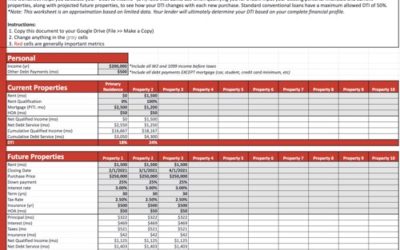What EVERY investor needs to know about gift funds and real estate investing, before buying a property.
This is an issue that trips up investors time and time again (oftentimes at the 11th hour before closing), and DEFINITELY warrants a good understanding if you have or plan to receive gift funds prior to closing.
The basic problem is this… Fannie Mae (the government entity that insures your mortgage on the open market) rules disallow gift funds for investors. Period. They technically do allow them for non-investors, however you will be asked to explain where the gift came come from, or worse, to provide bank statements from the donor themselves! Unless your wealthy donor is fine giving up their financials, this is a nightmare regardless.
Fannie Mae rules require 60 days of “seasoned” funds prior to closing. This simply means that they don’t want to see any large/abnormal deposits in your account(s) prior to close. Be VERY careful with the 60 day rule, as most of us start the loan application 1-2 months prior to close. When the bank requests statements of your accounts, any gift funds they find will be a red flag. Also keep in mind that earnest money is ALSO part of this. The bank doesn’t need 60 days of history for earnest money, but they will request a copy of the statement that shows the earnest funds leaving the account. If any gifts show up on that statement, your loan application will also be denied.
How best to handle gifts
The absolute best way to handle gifts is simply to not receive them until after closing. Did your rich Aunt give you a huge check for Christmas? Just wait to deposit it until after closing! You can also deposit the gift into another account and simply don’t use that account (see #4 below).
What if I need the gift to close or have already received it?
There is no guarantee here, as banks are free to add their own requirements on top of Fannie Mae rules, but these guidelines should work in most cases.
- Pay your earnest money from a DIFFERENT account than where you deposit your gift. That way, you can give the bank a statement without showing the gift. The only requirement is that the name on the account must match the name on the loan/title.
- If possible, time your gift so that it shows up at least 3 statements before closing. Even though the rule is 60 days, banks always ask for “your last two statements”.
- If your gift is less than 3 statements from closing (but still greater than 60 days), give your bank the most recent statement that does NOT show the gift. Then tell them you will give them the next statement when it comes out, prior to closing.
- Don’t disclose all of your accounts! You are only required to disclose the accounts that are part of the loan application and closing transaction. This generally means the account(s) for: earnest money, where you receive your paycheck, and where you will pay the down payment and closing costs.
- Don’t move money between accounts! Even if it has nothing to do with a gift, not only will they catch it, but now you’ll have to repeat all the paperwork for the other account(s).
I hate red tape, but these laws are actually a GOOD thing. Most of these were put into place after the financial crash of 2008. At the time, banks were lending to anybody with a pulse, and “gifting” funds to help people afford houses they otherwise couldn’t afford. By forcing banks to fully source (qualify) ALL funds used for closing, it significantly reduces the risk of borrower default, which ultimately improves all of our interest rates.
Source/credit: Fannie Mae
Read more real estate investing articles like this on the Ten Properties blog





